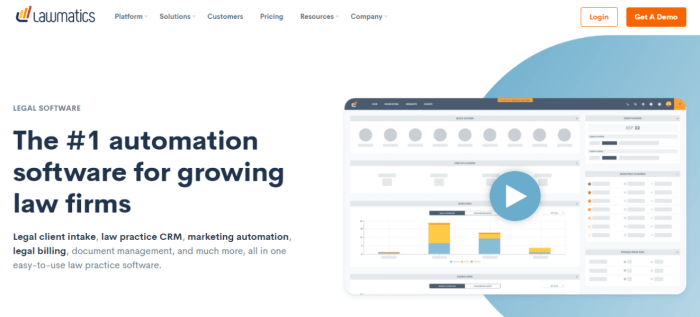Best crm software for law firms – Choosing the right Customer Relationship Management (CRM) software is crucial for law firms of all sizes. A robust CRM system can streamline operations, improve client communication, boost efficiency, and ultimately, enhance profitability. This comprehensive guide explores the best CRM software options specifically designed to meet the unique needs of legal professionals, considering factors like case management, document storage, billing, and client relationship tracking.
We’ll delve into key features, pricing models, and considerations to help you make an informed decision.
Understanding the Needs of a Law Firm CRM
Unlike other industries, law firms require a CRM system that goes beyond basic contact management. A legal CRM needs to seamlessly integrate with the complexities of legal practice, including:
- Case Management: Tracking case details, deadlines, and associated documents is paramount. The CRM should offer features for managing multiple cases simultaneously, assigning tasks to team members, and monitoring progress.
- Client Relationship Management: Building and maintaining strong client relationships is essential. The CRM should facilitate effective communication, personalized interactions, and a centralized repository for client information.
- Document Management: Secure storage and easy access to crucial legal documents are critical. The CRM should integrate with document management systems or offer robust internal storage capabilities.
- Time Tracking and Billing: Accurate time tracking and billing are crucial for profitability. The CRM should provide tools for tracking billable hours, generating invoices, and managing payments.
- Compliance and Security: Legal practices are subject to strict data privacy regulations. The chosen CRM must adhere to these regulations and offer robust security features to protect sensitive client information.
- Reporting and Analytics: Data-driven insights are valuable for improving efficiency and strategic decision-making. The CRM should provide customizable reports and analytics dashboards.
Top CRM Software Options for Law Firms: Best Crm Software For Law Firms
Several CRM platforms stand out as excellent choices for law firms, each offering a unique set of features and benefits. Here are some of the leading contenders:
1. Clio Manage
Clio Manage is a popular choice among law firms, known for its user-friendly interface and comprehensive features. It offers robust case management, client communication tools, time tracking, and billing capabilities. Its integration with other legal tech solutions enhances its functionality. Clio Manage Website
2. MyCase, Best crm software for law firms
MyCase is another strong contender, providing a streamlined platform for managing cases, clients, and documents. It excels in its ease of use and intuitive design, making it accessible to firms of all sizes. Its features include contact management, calendar scheduling, and secure document storage. MyCase Website
3. PracticePanther
PracticePanther offers a comprehensive suite of tools designed specifically for law firms. It boasts strong time tracking and billing features, along with robust case management and client communication capabilities. Its focus on legal-specific functionalities makes it a compelling option. PracticePanther Website

Source: webfx.com
4. CosmoLex
CosmoLex is a cloud-based CRM designed to streamline legal practice management. It integrates various features, including case management, time tracking, billing, and client communication. Its robust reporting and analytics tools provide valuable insights into firm performance. CosmoLex Website
5. Salesforce
While not exclusively designed for law firms, Salesforce’s highly customizable platform can be adapted to meet the specific needs of legal practices. Its extensive features and scalability make it a suitable choice for larger firms with complex requirements. However, its complexity may require significant setup and training. Salesforce Website
Factors to Consider When Choosing a Law Firm CRM
Selecting the right CRM requires careful consideration of several factors:
- Budget: CRM solutions vary significantly in pricing, from subscription-based models to one-time purchases. Consider your firm’s budget and choose a solution that offers the best value for your investment.
- Size and Structure of Your Firm: The size and structure of your firm will influence the features you need. Smaller firms might require simpler solutions, while larger firms may benefit from more complex, scalable systems.
- Integration Capabilities: Consider the CRM’s ability to integrate with other software used by your firm, such as accounting software, document management systems, and email platforms.
- User-Friendliness: Choose a CRM with an intuitive interface that is easy for your staff to learn and use. A complex system can lead to low adoption rates and reduced efficiency.
- Security and Compliance: Ensure the CRM meets all relevant data privacy and security regulations. Look for features like data encryption, access controls, and audit trails.
- Scalability: Choose a CRM that can grow with your firm. If you anticipate significant growth, select a system that can handle increased data volume and user accounts.
Frequently Asked Questions (FAQ)
- Q: What is the average cost of a law firm CRM? A: The cost varies widely depending on the features, number of users, and vendor. Expect to pay anywhere from a few hundred dollars per month to several thousand dollars per year.
- Q: Can I integrate my existing accounting software with a CRM? A: Many CRMs offer integration capabilities with popular accounting software. Check the vendor’s website or contact their support team to confirm compatibility.
- Q: How long does it take to implement a new CRM? A: Implementation time depends on the complexity of the system and your firm’s needs. It can range from a few weeks to several months.
- Q: What are the key benefits of using a CRM for a law firm? A: Benefits include improved client communication, enhanced case management, increased efficiency, better time tracking and billing, and improved data security.
- Q: Is cloud-based CRM better than on-premise CRM for law firms? A: Cloud-based CRMs offer greater flexibility, accessibility, and scalability, but on-premise solutions may offer more control over data security for some firms. The best choice depends on individual needs and priorities.
Conclusion
Choosing the right CRM is a significant investment for any law firm. By carefully considering the factors Artikeld above and researching the various options available, you can select a system that will streamline your operations, improve client relationships, and ultimately enhance the success of your practice. Don’t hesitate to take advantage of free trials and demos offered by various vendors to test the software and determine the best fit for your specific requirements.
Call to Action
Ready to transform your law firm’s efficiency and client relationships? Explore the options discussed in this guide and choose the CRM that best aligns with your needs. Contact a vendor today for a consultation and start your journey towards a more streamlined and profitable practice!
FAQs
What are the typical costs associated with CRM software for law firms?
Costs vary greatly depending on the features, number of users, and vendor. Expect a range from affordable monthly subscriptions to more substantial upfront investments for enterprise-level solutions. Many vendors offer tiered pricing plans.
How can I ensure my chosen CRM software is secure and compliant with data privacy regulations?
Look for vendors who explicitly state their security measures and compliance with regulations like GDPR and CCPA. Inquire about data encryption, access controls, and their incident response plan. Verify certifications like ISO 27001.
What are some common integration challenges when implementing CRM software in a law firm?
Challenges can include integrating with existing case management systems, legacy databases, and other firm-specific software. Thorough planning and vendor support are crucial to mitigate these issues. Consider APIs and data migration services.
How do I determine the best CRM software for my firm’s specific size and needs?

Source: webfx.com
Assess your firm’s size, caseload, and technological capabilities. Start by identifying your key requirements, such as contact management, case tracking, and reporting. Then, research vendors that offer solutions tailored to law firms of similar size and complexity.
